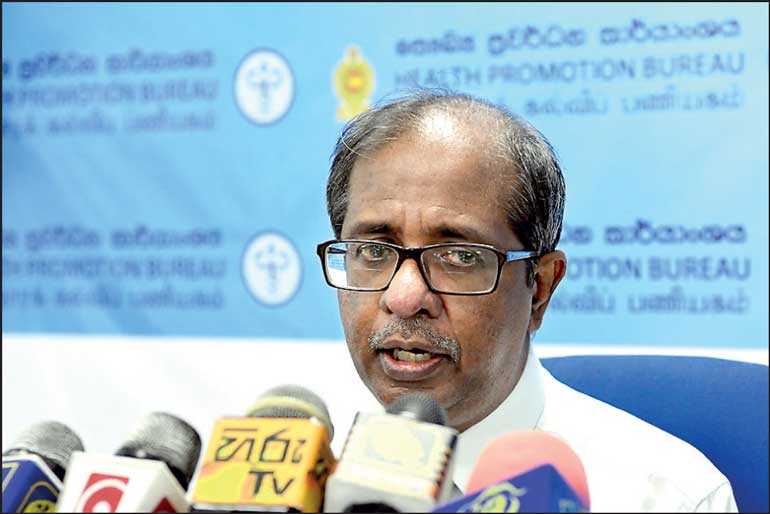Sunday Feb 22, 2026
Sunday Feb 22, 2026
Wednesday, 16 September 2020 00:02 - - {{hitsCtrl.values.hits}}

Chief Epidemiologist Dr. Sudath Samaraweera
By Shailendree Wickrama Adittiya
Health authorities yesterday voiced concerns over the organisation of social gatherings like the Colombo International Book Fair (CIBF) and the public’s reducing compliance with COVID-19 safety guidelines.
In response to questions raised at a press briefing held at the Health Promotion Bureau, Chief Epidemiologist Dr. Sudath Samaraweera stated the CIBF attracts large crowds every year, and that the Epidemiology Unit does not approve of such social gatherings amidst the COVID-19 pandemic.
“The best thing would have been to not hold the Colombo International Book Fair this year,” he said, adding that it would be disastrous if a COVID-19 patient happened to attend the exhibition.
“If the exhibition is held without adherence to physical distancing guidelines and a COVID-19 patient happens to attend it, there is a significant risk, because the CIBF is attended by people of all ages and from all over the country,” Dr. Samaraweera said.
He requested the public to instead opt for purchasing from bookstores and to adhere to all health guidelines if they were attending the exhibition. “If you cannot adhere to guidelines or are not prepared to do so, it is best to not attend the CIBF,” he added.
However, the Chief Epidemiologist went on to add that the Health Ministry had issued guidelines on how an exhibition of this nature should be organised and held during the pandemic, emphasising that they expected the organisers and attendees of the CIBF to adhere to these guidelines.
He went on to say that health guidelines in the country, especially regarding the quarantine process, will apply to the proposed test cricket series between Sri Lanka and Bangladesh. While the test series was scheduled to begin on 23 October, there is uncertainty regarding the event due to a refusal from Bangladesh to adhere to Sri Lanka’s quarantine requirements.
“As per health guidelines, the Bangladesh team, those accompanying the team, support and technical staff, and International Cricket Council (ICC) officials will be given certain quarantine guidelines and they will be required to follow them,” Dr. Samaraweera said.
He added that the two teams will be required to come into contact during the tournament, which posed a risk of COVID-19 spread among the teams. If the guidelines cannot be adhered to, an alternative process will have to be considered, he stated, adding that a 14-day quarantine was important in this instance.
The Chief Epidemiologist explained that the country’s success in containing the spread of COVID-19 was partly due to the unique approach taken with regard to quarantine measures. During the initial stages, he said, PCR testing of overseas arrivals was carried out at the quarantine centres, but samples are now collected at the airport itself.
The health authorities were also taking measures to reduce the risk of community transmission from overseas arrivals, for instance by extending quarantine periods when an individual from a group undergoing quarantine tests positive.
However, requirements like a mandatory 14-day quarantine were not practical if the country was to reopen for tourism. In addition to this, there were several risk factors involved in reopening the airport completely.
According to Dr. Sudath Samaraweera, the levels of safety of other countries were a concern and discussions between tourism and airport authorities and the Health Ministry are ongoing as they are yet to make a decision on the matter.
“It is more important to bring back the 50,000 to 60,000 Sri Lankans who need to return to the country immediately due to not having visas, employment, or housing,” he added.
Dr. Samaraweera also drew focus to the measures taken with regard to local cases, explaining that contact tracing took place as soon as a patient was identified in the country. While contacts and close associates were initially required to self-quarantine, they are now required to undergo quarantine at a centre for 14 days, following which they are self-quarantined for a further 14 days.
While these measures play a crucial role in containing the spread of COVID-19 in the country, it has also given the public a false sense of security and a lack of adherence to health guidelines.
The Chief Epidemiologist thus emphasised the need to follow health guidelines, for instance, wearing masks properly so that both the mouth and nose are covered, observing good hand hygiene, and maintaining physical distancing, especially in public transport and social gatherings.
Echoing these views was Director of Health Education and Publicity Consultant Community Physician at the Health Promotion Bureau Dr. Palitha Karunapema, who stated that the public played a key role in containing the spread of COVID-19 in the country and that the health authorities expected the public to continue to follow health guidelines. Lapses in doing so are apparent, he added.
“The fear and uncertainty in people’s minds reduces with the lack of community cases being identified. We cannot blame them,” he commented.
However, there was a need to ensure these safety guidelines were being adhered to, especially with the reopening of schools and other establishments and Dr. Karunapema said it was the responsibility of organisation heads to provide the necessary facilities to do so.
Addressing concerns about the use of cloth masks, he said that while N95 masks offer more protection, the usage of cloth masks was not a concern as it was more important that people wear face masks properly.
Pix by Shehan Gunasekara
